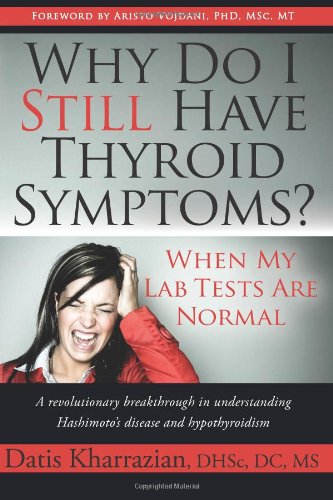
Dr. Datis Kharrazian,
Thyroid Book
Thyroid Nation
A new study shows Hashimoto’s patients with symptomless celiac disease (i.e., no digestive complaints) require 49 percent more T4 to achieve the same TSH levels as non-celiac Hashimoto’s patients.
After the patients followed a gluten-free diet for 11 months their TSH levels came down with the same T4 requirement as the non-celiac Hashimoto’s patients.
Gluten sensitivity linked with Hashimoto’s hypothyroidism
This is yet another study that demonstrates the clinical association between gluten sensitivity and Hashimoto’s hypothyroidism. It is very rare to find a person with Hashimoto’s who does not have some degree of G sensitivity or full-blown celiac disease.
Gluten overstimulates the immune system
Gluten sensitivity is basically defined as any immune response to gluten.
Celiac disease is defined generally as an autoimmune response to intestinal tissues upon gluten exposure, as well as overall activation of the immune system Various labs classify celiac disease using different criteria, including genetic testing and intestinal biopsy.
Either way, such an immune response is never good for a person with Hashimoto’s or other autoimmune disease. The immune system is already imbalanced and overactive during an active autoimmune condition. A consistent immune reaction to a regular food in the diet only makes the immune system more volatile, further exacerbating the autoimmune condition.
This overall activation of the immune system creates inflammation and explains why symptoms of G sensitivity vary. For some the inflammation may target the joints, creating pain and swelling. For others skin rashes and skin disorders ensue. Many others suffer inflammation in the brain, resulting in brain fog, mood and anxiety disorders, or memory loss.
The list of inflammation-induced symptoms brought on by a G sensitivity goes on and depends upon the person’s genetic makeup. Needless to say such systemic inflammation also flares up an autoimmune condition.
Experience shows a gluten-free diet is a must
In my experience, most Hashimoto’s patients fall somewhere between gluten sensitivity and celiac disease. Nevertheless, almost all patients with Hashimoto’s improve on a strict gluten-free diet, even if they do not fit the established criteria of celiac disease. By strict I mean you are 100 percent gluten-free. Because the immune reaction to it has been shown to last up to six months after exposure, cheat days or occasionally eating G will derail the therapeutic benefits of a gluten-free diet.
Practitioners wrong when they say gluten OK
I have seen many patients over the years with Hashimoto’s whose health care practitioners have told them they can eat G because they had a normal gluten antibody test (meaning there is no sensitivity) or they did not have the gene for gluten sensitivity. This a horrible mistake and a complete disconnect with the realities of what a serious immune trigger gluten is for most people with Hashimoto’s, unassociated with celiac disease.
 Problem lies with incomplete gluten testing
Problem lies with incomplete gluten testing
I am now convinced that part of the problem with negative gluten antibody tests is improper testing. The general gluten antibody test conducted by most labs today is only testing a small portion of the gluten protein, alpha-gliadin.
In reality, an individual can have an immune response to various parts of the gluten protein, including omega-gliadin, gamma-gliadin, wheat germ agglutinin, and deamidated gliadin.
In my practice the only valid and complete gluten assessment is a panel called the Wheat/Gluten Proteome Sensitivity and Autoimmunity test by Cyrex Laboratory in Phoenix, Arizona. The panel also provides testing for transglutaminase antibodies, the marker for autoimmunity against intestinal tissue. This marker strongly suggests celiac disease or at least an autoimmune reaction in the small intestine in response to gluten.
Other factors in G testing
If you are a thyroid patient who tested negative for alpha-gliadin antibodies and have been told it is OK to eat gluten, that advice could be harmful to your condition as you may be reacting to one of these other components of G.
Also, newer research shows that people may have a gluten cross-reactivity, meaning they react to other foods as if they are gluten, another scenario for which Cyrex Labs screens. Lastly, if your immune system is depressed and exhausted, you may not be able to make enough antibodies to register positive on a lab panel, even though an immune reaction is taking place. In this instance, restoring immune health will often then produce a positive antibody response to G on a lab test.
Both the scientific and clinical evidence linking G with Hashimoto’s and autoimmune disease in general is too powerful and abundant to ignore. A strict GF diet is the first and most important step to managing your Hashimoto’s hypothyroidism.
For more information about managing your autoimmunity and protecting your brain health, you can also read my new book Why Isn’t My Brain Working?
About the Author
 Dr. Datis Kharrazian, DHSc, DC, MS, MNeuroSci, FAACP, DACBN, DABCN, DIBAK, CNS is considered one of the leading experts in non-pharmaceutical applications to chronic illnesses, autoimmune disorders, and complex neurological disorders. Patients from all over the world fly into his practice located in San Diego, California to understand his perspective regarding their condition and to apply natural medicine alternatives to help them improve their quality of life. Dr. Kharrazian has become the referral source for many doctors nationally and internationally when their cases becomes too complex to evaluate and diagnose. Dr. Kharrazian’s first book, Why Do I Still Have Thyroid Symptoms When My Lab Tests Are Normal? quickly became the best-selling thyroid book. It has been listed as the number-one selling thyroid book on Amazon since its release in October of 2009. Dr. Kharrazian earned his Bachelor of Science degree from the University of the State of New York with honors and his Doctor of Chiropractic degree graduating with honors from Southern California University of Health Sciences, where he was distinguished with the Mindlin Honors at Entrance Award, the Dean’s List, and the Delta Sigma Award for Academic Excellence. He has earned a Master of Science degree in Human Nutrition from the University of Bridgeport, a Master of Neurological Sciences from the Carrick Institute of Graduate Studies, and a Doctor of Health Science from Nova Southeastern University. He is currently completing his Ph.D. in health sciences with doctoral research in immunology at Nova Southeastern University. Read the original article, here DrKnews.com.
Dr. Datis Kharrazian, DHSc, DC, MS, MNeuroSci, FAACP, DACBN, DABCN, DIBAK, CNS is considered one of the leading experts in non-pharmaceutical applications to chronic illnesses, autoimmune disorders, and complex neurological disorders. Patients from all over the world fly into his practice located in San Diego, California to understand his perspective regarding their condition and to apply natural medicine alternatives to help them improve their quality of life. Dr. Kharrazian has become the referral source for many doctors nationally and internationally when their cases becomes too complex to evaluate and diagnose. Dr. Kharrazian’s first book, Why Do I Still Have Thyroid Symptoms When My Lab Tests Are Normal? quickly became the best-selling thyroid book. It has been listed as the number-one selling thyroid book on Amazon since its release in October of 2009. Dr. Kharrazian earned his Bachelor of Science degree from the University of the State of New York with honors and his Doctor of Chiropractic degree graduating with honors from Southern California University of Health Sciences, where he was distinguished with the Mindlin Honors at Entrance Award, the Dean’s List, and the Delta Sigma Award for Academic Excellence. He has earned a Master of Science degree in Human Nutrition from the University of Bridgeport, a Master of Neurological Sciences from the Carrick Institute of Graduate Studies, and a Doctor of Health Science from Nova Southeastern University. He is currently completing his Ph.D. in health sciences with doctoral research in immunology at Nova Southeastern University. Read the original article, here DrKnews.com.
Questions or anything to ask Dr. K? We want your thoughts in the comments section–Please!



